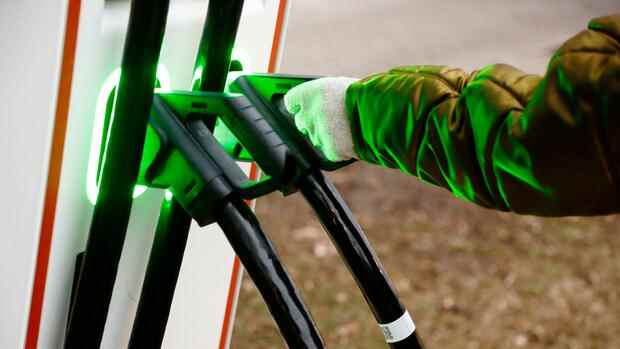Energy price increases show up faster at the gas station than at the socket.
(Photo: Imago)
Dusseldorf Since the start of the Ukraine war a good two weeks ago, fuel prices have risen dramatically. According to ADAC, petrol cost an average of 2.20 euros per liter nationwide last Sunday, and diesel even cost 2.30 euros. This means that prices have risen by around ten and 15 cents respectively within five days. According to ADAC, since the Russian invasion of Ukraine on February 24, Super E10 has become more expensive by a good 25 percent, and diesel has even increased by around 38 percent.
Given these record prices, drivers of electric cars currently have an advantage. This shows an invoice from the comparison portal Verivox on Monday. Accordingly, the saving compared to a petrol car is currently 59 percent, compared to a diesel car at 57 percent.
How can the cost difference between the drive types be calculated? And how long will the advantage of the electric car over the combustion engine last?
Current comparative calculation
According to Verivox, the average power consumption of the ten electric car models that were most frequently registered in 2020 is 19 kilowatt hours (kWh) per 100 kilometers. Since, according to a study by the market research company EuPD Research, 77 percent of all charging processes take place at home, Verivox calculates with household electricity prices. According to the comparison portal, they were last at 37.02 cents per kWh.
Top jobs of the day
Find the best jobs now and
be notified by email.
For 100 kilometers driven, an electric car driver pays about 7.04 euros. With an annual mileage of 15,000 kilometers, that would be around 1055 euros per year.
According to Verivox, a petrol engine consumes an average of 7.7 liters per 100 kilometers. With the petrol price of 2.20 euros last determined by the ADAC, this corresponds to 16.94 euros per 100 kilometers – and 2541 euros per year. For diesel cars, the portal calculates an average consumption of 7 liters. At a cost of EUR 2.30 per liter, a driver would therefore end up with EUR 16.22 per 100 kilometers and EUR 2433 per year.
With that one would Electric car owner currently calculated for the year 57 percent less pay as a driver with diesel car and 59 percent less as someone with petrol engine.
Alternatively, similar car models can be compared with each other. A VW E-Golf with a consumption of 17.3 kWh per 100 km costs around 6.40 euros. A petrol VW Golf 1.5 eTSI with 6.1 liters consumption costs 13.42 euros. For a diesel Golf 2.0 TDI with a consumption of 4.8 liters it is 11.04 euros.
How are prices going?
Up to which level fuel and electricity prices will rise in view of the Ukraine war cannot be reliably predicted. However, there are a few clues.
First of all, it can be assumed that the energy price increases will reach the pump first. Electricity price increases on the market, on the other hand, made themselves felt in households with a delay, says Udo Sieverding, head of the energy department at the NRW consumer advice center.
However, Sieverding also says that more electricity comes from solar systems, at least in summer, so that expensive gas-fired power plants are then hardly needed for generation. If generation is cheaper, the electricity price also falls.
>> Read also: In this way, consumers can reduce their dependency on natural gas
In addition, the development of the respective prices depends on where and to what extent the federal government intervenes. In view of the high energy prices, the traffic light coalition has promised relief for citizens. Exactly what they look like is still a matter of debate.
On the one hand, a so-called tank discount, which Finance Minister Christian Lindner (FDP) has proposed, is under discussion. This could look something like this: At the checkout, at least 20 cents per liter are deducted from the customer’s bill. The CDU and CSU had previously proposed a reduction in mineral oil and value added tax.
More generally, an energy price brake, energy money or gas and electricity price caps are up for debate. However, it is already certain that the EEG surcharge will apply to the electricity price from July – an amount of 3.72 cents per kWh.
More: Production stops and supply gaps: This is how the war drives the economy into crisis



